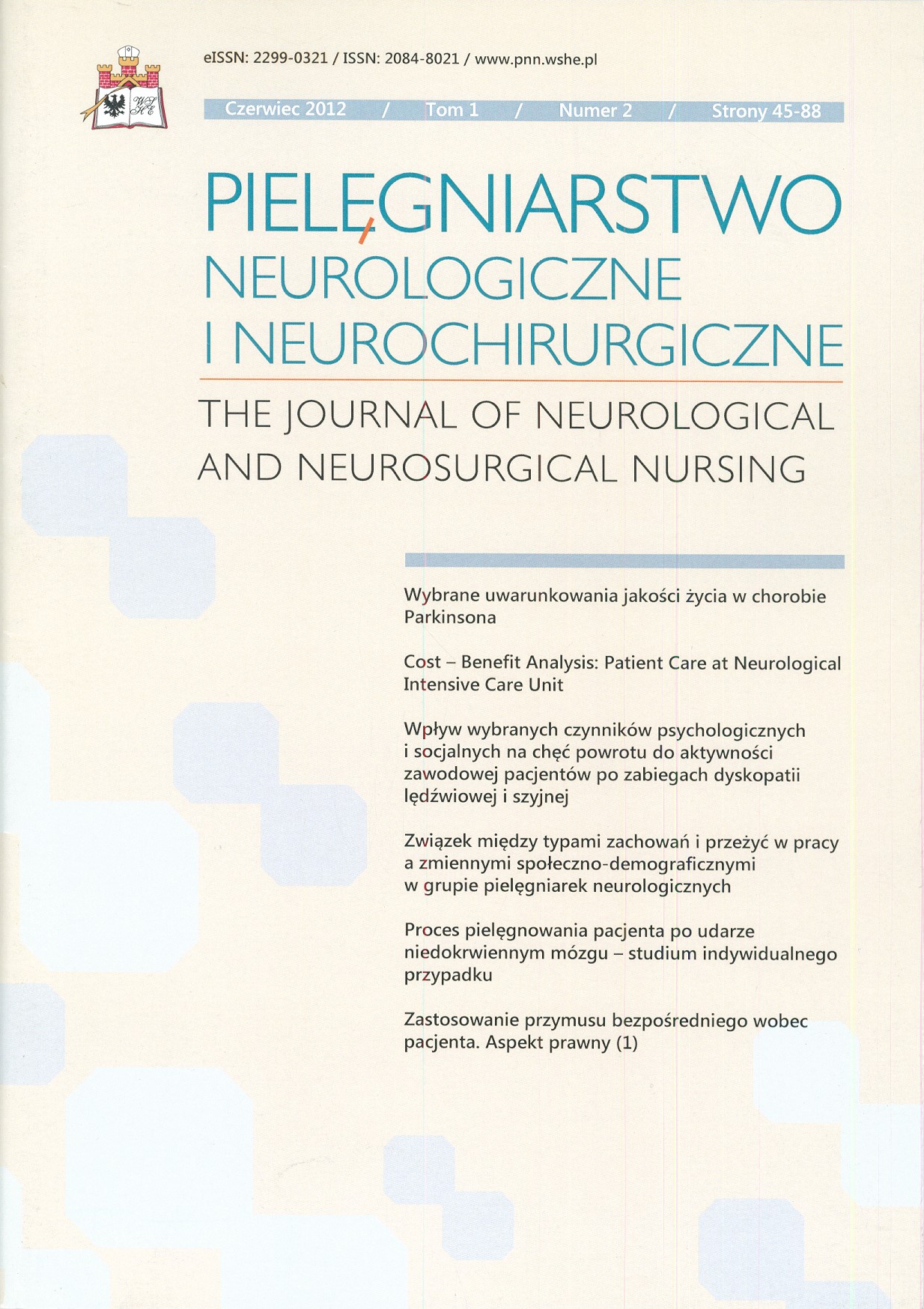Wybrane uwarunkowania jakości życia w chorobie Parkinsona
Słowa kluczowe
choroba Parkinsona, wydolność funkcjonalna, depresja, jakość życiaAbstrakt
Wprowadzenie. Coraz większe znaczenie w procesie leczenia choroby Parkinsona przywiązuje się do działań zmierzających do poprawy funkcjonowania pacjenta w codziennym życiu. Zainteresowanie nauk medycznych przesunęło się poza tradycyjny, czysto medyczny obszar działania, skupiając się na aktywności podopiecznych w różnych dziedzinach życia.
Cel. Celem pracy była ocena wpływu wybranych czynników na jakość życia pacjentów z chorobą Parkinsona.
Materiał i metody. Badania przeprowadzono wśród 75 osób z chorobą Parkinsona w Krakowskim Stowarzyszeniu Chorych z Chorobą Parkinsona, w Krakowskiej Klinice Neurologii oraz w Sądeckiej Przychodni Kolejowej w okresie od listopada 2010 do kwietnia 2011 roku. Materiał badawczy w pracy został zebrany za pomocą stan-
daryzowanego kwestionariusza Parkinson’s Disease Questionnaire 39 (PDQ 39) służącego do oceny jakości życia i stanu zdrowia pacjentów z chorobą Parkinsona, skali Lawtona (Instrumental Activities of Daily Living – IADL) służącej do oceny sprawności funkcjonalnej badanych w zakresie złożonych czynności życia codziennego oraz geriatrycznej skali depresji.
Wyniki. Badania wykazały, że choroba Parkinsona negatywnie oddziałuje na wszystkie badane składowe jakości życia. W największym stopniu ogranicza mobilność pacjentów (74%), uniemożliwia sprawne wykonanie podstawowych czynności dnia codziennego (69%). W następstwie choroby 61% badanych, odczuwa stały dyskomfort ciała oraz ograniczenia funkcji poznawczych. Aż 60% ma problemy rodzące się w kontaktach z innymi ludźmi z powodu stygmatyzacji choroby, zaś 57% problemy w zakresie komunikowania się oraz zaburzeń emocjonalnych. Wykazano również, że tylko 36% pacjentów nie było obciążonych depresją, u 61% badanych stwierdzono umiarkowane nasilenie depresji.
Wnioski. Choroba Parkinsona w największym stopniu ogranicza możliwości swobodnego przemieszczania się pacjenta zarówno w miejscu publicznym jak i w obrębie własnego mieszkania. Choroba pozbawia człowieka możliwości sprawnego posługiwania się telefonem, który jest podstawowym narzędziem komunikacji. Chorzy, którzy sami prowadzą gospodarstwo domowe wykazują większą odporność psychiczną w obliczu ciężkiej i nieuleczalnej choroby, pomimo większych dysfunkcji w zakresie sprawności funkcjonalnej. Objawy depresji są jednym z czynników, które obniżają jakość życia w chorobie Parkinsona. (PNN 2012;1(2):48-57)
Bibliografia
Jasik J., Mróz A. Jakość życia i sposób funkcjonowania osób niepełnosprawnych w szpitalu a zarządzanie informacją. W: Lewandowski J., Lecewicz-Bartoszewska J., Sekieta M. (Red.), Ergonomia niepełnosprawnym w przyszłości. Łódź 2003;232-239.
Tobiasz-Adamczyk B. Wybrane elementy socjologii zdrowia i choroby. Collegium Medicum UJ, Kraków 1995.
Skrzypek E. Czynniki kształtujące jakość życia. Materiały z V Międzynarodowej Konferencji Naukowo-Technicznej Ergonomia Niepełnosprawnym. Jakość Życia MKEN, Łódź 2001.
Dubelt T. Choroba Parkinsona, objawy kliniczne, diagnostyka i leczenie farmakologiczne. Czelej, Lublin 1999.
Friedman A. Choroba Parkinsona – od rozpoznania do leczenia. Nowa Klinika Medica Press, Warszawa 1997.
Jenkinson C., Fitzpatrick R., Peto V. The Parkinson´s Disease Questionnaire (PDQ-39): development and validation of the Parkinson´s disease summary index score. Age and Ageing. 1997;26:353-357.
Lawton M.P., Brody E.M. Assessment of older people: Self-maintaining and instrumental activities of daily living. Gerontologist.1969;9:179-186.
Yesavage J.A. Geriatric Depression Scale. Psychopharmacology Bulletin. 1988;24:709-710.
Chrobak M. Ocena jakości życia zależnej od stanu zdrowia. Problemy Pielęgniarstwa. 2009;17(2):123-127.
Muszalik M., Kędziora-Kornatowska K. Jakość życia przewlekle chorych pacjentów w starszym wieku. Gerontologia Polska. 2006;14(4):185-189.
Olanow C., Watts R., Koller C. Algorytm postępowania w chorobie Parkinsona. Czelej, Lublin 2002.
Królikowska A., Ślusarz R., Gryszko R., Harat M., Beuth W. Ocena funkcjonalna stanu chorego po leczeniu operacyjnym choroby Parkinsona. Annales UMCS. 2005;7:106-109.
Sobstyl M., Ząbek M., Koziara H., Kądzioła B. Ocena jakości życia po operacjach ablacyjnych w leczeniu choroby Parkinsona. Neurologia Neurochirurgia Polska. 2003;Supl.5:221-230.
Jasińska-Myga B., Sławek J. Depresja w chorobie Parkinsona. Polski Przegląd Neurologiczny. 2006;2(4):210-215.
Kamrowska A. Depresja w chorobie Parkinsona. Polski Merkuriusz Lekarski. 2009;28:158,170-172.
Pobrania
Opublikowane
Jak cytować
Numer
Dział
Licencja

Utwór dostępny jest na licencji Creative Commons Uznanie autorstwa – Bez utworów zależnych 4.0 Międzynarodowe.
Statystyki
Liczba wyświetleń i pobrań: 1561
Liczba cytowań: 0
